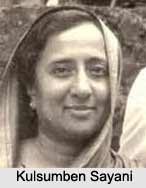 Kulsumben Sayani was an ardent patriot, a reputed constructive worker, and a life-long crusader in the cause of adult literacy. She made it her mission to propagate literacy, especially among the purdhah-clad women of the Muslim society. These women had to lead the life of slaves imprisoned in the four walls of their house. She was determined to illumine the darkness of ignorance through the light of education. Her contribution in the field of literacy is unforgettable and needs to be mentioned as long as generation exists.
Kulsumben Sayani was an ardent patriot, a reputed constructive worker, and a life-long crusader in the cause of adult literacy. She made it her mission to propagate literacy, especially among the purdhah-clad women of the Muslim society. These women had to lead the life of slaves imprisoned in the four walls of their house. She was determined to illumine the darkness of ignorance through the light of education. Her contribution in the field of literacy is unforgettable and needs to be mentioned as long as generation exists.
Kulsumben Sayani was born in Bombay on 21 October 1900. Her father, Rajab Ali Patel was the personal physician of Maulana Azad and also acted as physician to Mahatma Gandhi for some time. On Gandhiji`s return from South Africa her father took her to meet him. Gandhiji gave her a very warm welcome and asked her to stay with Janaki Devi for some time. Janaki Devi once mentioned that it was extremely difficult to work with purdhahnashin women and though she tried to organise a meeting to enlighten them, hardly a couple of them comes. It was this incident, which opened her eyes to fulfill the mission of eradication of illiteracy among the purdahnashin women.
Kulsumben Sayani was convinced that the root cause of all our troubles is ignorance and hence spread of education is one of the most effective ways for attaining the progress and prosperity of the country. She started literacy work with an investment of just Rs.100 and with two teachers to help her. It was a very difficult task as the teachers were not motivat-ed and the learners were not very keen in learning. Kulsumben , in order to enlighten them, went from lane to lane and house to house explaining to women how important it was to learn to read and write. As a result more than 400 women came forward to learn.
Kulsumben Sayani published the jour-nal, Rahbar, which was used in the literacy classes conducted by the Bombay City Social Education Committee. It was the only journal to be published in three scripts, namely, Urdu Devanagari and Gujarati. There were a series of lectures in it explaining the rational basis of religion and the position of women in society, in order to broaden the vision of the people enabling them to think for themselves. These lectures were greatly resented by the Moulvis and other orthodox sections of the Muslim society. The greater the resentment the firmer became the determination of Kulsumben to strike at the foundation of orthodoxy and lead people towards an enlightened society.
When Kulsumben Sayani became the Honorary Sec-retary of the All India Women`s Conference, she undertook country wide tours, visited different schools and motivat-ed young girls to teach their mothers adopting the princi-ple of `each one teach one` to spread adult literacy.
Due to her untiring efforts, the membership of the Conference grew from 6,500 to 33,500 and she was appointed as the member of the National Committee on Wom-en`s Education. For spreading adult literacy, Kulsumben looked to-wards both our ancient culture and also the modern methods of the west. Thus, she emphasized the role of Kathas, Kirtans, Powadas, (combining music and oral nar-ration), or education through entertainment and use of mass media, including films, drama, radio, exhibitions etc (TV was not in vogue then). She gave freedom for teachers to devise and utilize innovative methods. To spread the message of literacy, she used religion as a means of acquiring new knowledge and correlated the course-content with the actual life-conditions of the society, as explained by Gandhiji in his scheme of Nai Talim or Basic Education. Kulsum was in favour of organizing and utilizing prayer meetings for bringing people of different faiths and acquainting them with different cultures. It was with this objective in view that she began holding inter-religious meetings in the Bombay Gandhi Smarak Nidhi of which she was a Trustee and established close links between the Nidhi and the Social Education Committee.
Kulsumben Sayani was awarded the prestigious Nehru Literacy Award in recognition of her services in the field of adult literacy. They hailed her as a Gandhian constructive worker who had devoted her whole life to the cause of education and enlightenment. Kulsumben`s contribution in the international field was no less spectacular. She was invited to the workers` seminar in France. She represented India on the Consultative Committee on Adult Education, constituted by UNESCO. Again she represented India as a delegate to the seminar on Adult Education in Denmark where she visited many Danish Folk Schools and brought back rich experience, which proved useful to India.
Kulsumben Sayani`s illustrious life and her missionary zeal for the cause of education of illiteracy led the country on the path of progress and prosperity. Thus the light of knowledge spread throughout the world eradicating all evils in society.




















